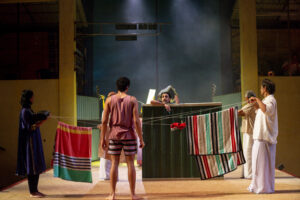Jessica Harris watches a Rep production stretching around the world.
Radha has been holding onto the ashes of her grandfather for 21 years and, along with them, memories of her homeland, Sri Lanka. Heavily pregnant and believing her husband to have been killed, she fled the country as a young woman at the outbreak of civil war in 1983. Her new life in Australia has provided for her materially, but the past will not go away.
This ambitious and colourful production brings to the stage the legacy of British rule in Sri Lanka. The resulting crisis within Radha’s family is played out against a backdrop of violence and insurgency, which is traced back in the play to imperialism. As Sinhalese and Tamil communities each strive to recover dignity and power, the impact on the family is immediate. Themes of migration and exile, love and separation, cultural heritage and diversity, are played out with intensity, but also with humour.

The staging of the play is one of its strongest features, bringing a lightness to some challenging issues. With nineteen performers from six different countries, speaking three languages, Tamil, Sinhala and English, delivery of the production is adept and fast. The set is pared back, allowing for charming use of props to suggest scene changes and convey meaning. The sea is created from a shimmering blue sheet, whilst rain is conjured up through rice dropped onto a tray. Interpreters are a key part of the performance, contributing to the action through gesture and body language. There are some lovely moments of playfulness as characters on stage turn to an interpreter and correct what they have said.
Lighting provides a sense of place, whilst three musicians, playing flute, tabla, violin and other instruments, are on stage throughout, conveying atmosphere. There is also a wonderful moment of dance from Vaishnavi Suryaprakash, who plays young Radha.
One or two scenes lag a little, as background information takes prominence over dramatic action, and there is room for cuts, particularly in Act 3, when the script runs the risk of over-explaining the wider context of politics and migration. Crucial though this is, the production slips into telling us things, rather than showing us through the characters. The telephone, as a means of giving voice to characters off-stage, is also over-used, particularly to build the sense of rising tension and erupting violence in Act 3.
But overall, this production is well worth seeing. It reaches for the heights and largely achieves them. Although the subject matter is specific to Sri Lanka and Australia, its significance is universal, and it is impossible not to think of vulnerable people, suffering from threat and persecution, crossing rough seas in small boats across the world.
We are left with the words of Radha’s grandfather, Apah: One Country, Two Languages. People from diverse backgrounds living together is possible, is desirable. The final image, three people of Sri Lankan origin embracing with a woman of Australian Aboriginal heritage, is particularly strong.
Counting and Cracking was written by S. Shakthidharan, a Sri Lankan-Australian who researched and developed the work over the course of ten years. It was directed by Eamon Flack, the Artistic Director of Belvoir, one of Australia’s most celebrated theatre companies, with S. Shakthidharan.
It is presented by the Birmingham Rep and the Edinburgh International Festival, as part of the Birmingham 2022 Festival, celebrating the 2022 Commonwealth Games. It runs at the Birmingham Rep until 27th August. For further information visit birmingham-rep.co.uk
Pics – Brett Boardman.


